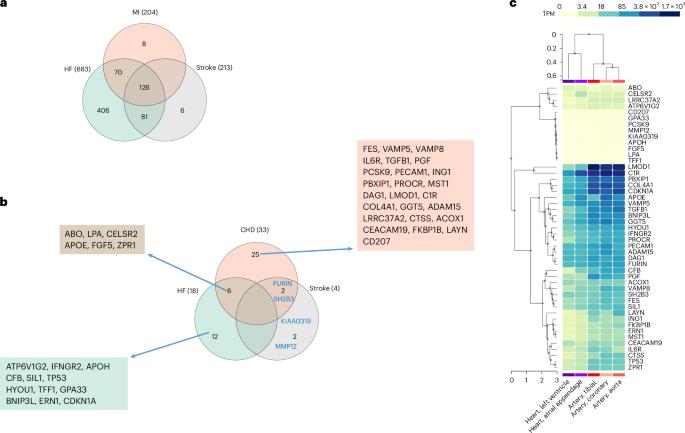Measured and genetically predicted protein levels and cardiovascular diseases in UK Biobank and China Kadoorie Biobank
IF 9.4
Q1 CARDIAC & CARDIOVASCULAR SYSTEMS
引用次数: 0
Abstract
Several large-scale studies have measured plasma levels of the proteome in individuals with cardiovascular diseases (CVDs)1–7. However, since the majority of such proteins are interrelated2, it is difficult for observational studies to distinguish which proteins are likely to be of etiological relevance. Here we evaluate whether plasma levels of 2,919 proteins measured in 52,164 UK Biobank participants are associated with incident myocardial infarction, ischemic stroke or heart failure. Of those proteins, 126 were associated with all three CVD outcomes and 118 were associated with at least one CVD in the China Kadoorie Biobank. Mendelian randomization and colocalization analyses indicated that genetically determined levels of 47 and 18 proteins, respectively, were associated with CVDs, including FGF5, PROCR and FURIN. While the majority of protein–CVD observational associations were noncausal, these three proteins showed evidence to support potential causality and are therefore promising targets for drug treatment for CVD outcomes. Lind et al. investigate the causal relationship between plasma proteins and cardiovascular disease outcomes in patients of European and Chinese descent, identifying FGF5, PROCR and FURIN as promising targets for the development of new drugs.

英国生物库和中国嘉道理生物库中测量和基因预测的蛋白质水平与心血管疾病。
有几项大规模研究测量了心血管疾病(CVDs)患者的血浆蛋白质组水平1-7。然而,由于大多数此类蛋白质是相互关联的2,因此观察性研究很难区分哪些蛋白质可能与病因有关。在此,我们评估了在 52,164 名英国生物库参与者中检测到的 2,919 种蛋白质的血浆水平是否与心肌梗死、缺血性中风或心力衰竭事件有关。在这些蛋白质中,126 种与所有三种心血管疾病结局相关,118 种与中国嘉道理生物库中的至少一种心血管疾病相关。孟德尔随机化和共定位分析表明,分别有47种和18种蛋白质的基因水平与心血管疾病相关,其中包括FGF5、PROCR和FURIN。虽然大多数蛋白质与心血管疾病的观察关联都不是因果关系,但这三种蛋白质显示出支持潜在因果关系的证据,因此是治疗心血管疾病的药物治疗目标。
本文章由计算机程序翻译,如有差异,请以英文原文为准。
求助全文
约1分钟内获得全文
求助全文

 求助内容:
求助内容: 应助结果提醒方式:
应助结果提醒方式:


